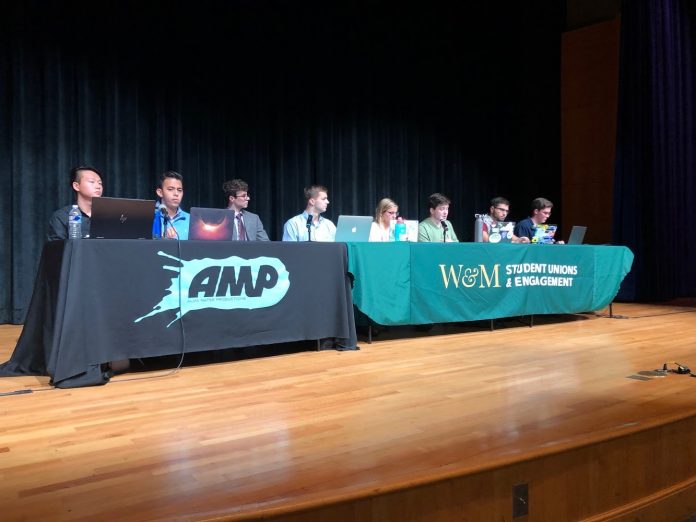
Friday, Oct. 25, amidst the beginning of the House of Representative’s official inquiry into the impeachment of President Donald Trump and the Democratic Party’s presidential primary debates, eight students sitting on a brightly lit stage at the College of William and Mary opened their laptops, grabbed their microphones and prepared to debate their political views. At the event, AMP Contemporary and Cultural Issues Committee teamed up with the Debate Society to host an “Election Debate” between the College Republicans, Young Democrats, Young Moderates and the Young Democratic Socialists of America.
All four political organizations chose two student representatives to share and debate their personal political opinions at the event. Moderated by two members of the Debate Society, each group was given two minutes to answer questions regarding an array of current political topics.
“Debate society is all about fostering communication between people who hold different beliefs and promoting constructive discussions,” debate moderator Amelia Larson ’21 said. “It’s really important for us to be able to help provide a platform today for people to talk across these boundaries and for audience members to get a sense of where other people are on issues. We think that kind of communication is really important for people both to communicate their beliefs but also to form their beliefs and find where they fit.”
The debate began with the moderators asking the groups six questions that the students had prepared for before the debate. Covering immigration reforms, healthcare, foreign intervention, geopolitical challenges, universal income and student activism, the debaters shared their perspectives on the ongoing issues before arguing how federal and state governments should address these topics.
While audience spectator Aaraj Vig ’23 attended the debate to show his support as a dual member of two participating political organizations on stage, he was also interested to see what students with opposing political ideologies had to say.
“It was really great seeing a few varying political ideologies discuss what their different takes are on different political issues,” Vig said. “The questions were all very topical and relevant, especially with regard to the current political climate, and I think that the moderators and audience questions combined created a very robust line of questioning that gives a lot of good insights into what these leading political ideologies are.”
After the prepared questions, the audience submitted additional questions to the debaters. Two audience members directed their questions to the College Republicans’ representatives specifically, inquiring about their opinions on transgender rights and North Carolina’s racial gerrymandering.
Audience member Michael Gibson ’23 attended the event to gain better exposure to political groups on campus and believed that the AMP event had a better atmosphere for dialogue than recent Democratic primary debates.
“It just seemed better moderated and a little bit more civil,” Gibson said. “They were given more time to talk and instead of a ton of people just trying to sell themselves in short little soundbites that sound really idealistic, this seemed more like a debate to me. Like actually bouncing back and forth different ideas to each other.”
While each group had varying opinions on each topic, one of the most contested issues of the event was China’s role within the international community. When the moderators asked debaters what the main threat to the United States was, the College Republicans indicated their concerns with China’s carbon dioxide emissions and decried their involvement in the South China Sea. While the Young Moderates echoed these sentiments in their response, citing the trade war and pollution, the Young Democrats defended China, mentioning its investment in the environment and infrastructure involvement in Asia and Africa.
“China is far from a perfect country, but we have to return to the first thing YDSA mentioned: climate change,” Young Democrats Representative Louisa Janssen ’20 said. “It is a little bit shameful we’re out here bashing China when they have done more than the United States to fix the wrongs they have done to the climate; they have done so much to invest in green energy sector in ways that the United States would never dream of.”
In the first and only out-of-order response of the night, the Young Republicans defended their original statement after Janssen’s rebuttal. Going against the ideal of learning from China, Eugene Lee ’23 cited China’s recent repression of Uyghurs, an indigenous Muslim people.
Following this question round, each group was given one minute to discuss any issue of their choice. The Young Democrats used this time to discuss the systemic oppression of votes, the YDSA credited meaningful change to grassroots organizations, and the College Republicans discussed how Trump’s efforts to strengthen the border do not stem from racism. However, the Young Moderates, who spoke last, addressed a previous comment from the YDSA regarding the two young moderates’ privilege and class interest. The Young Moderates’ response was the only statement of the night to be awarded with a standing ovation.
“I wanted to talk to the YDSA, not talking me facing forward, but talking to you,” Young Moderate Will McCleery ’19 said. “I’m not going to sit here and be insulted by you, because I’m not insulted by what you said. You can’t have a dialogue with people unless you’re willing to listen to people, and I’m listening to you man, and I hear what you’re saying about privilege. I checked mine out at the door. Trust me on that, and if you don’t think I did, I’m trying and that’s sometimes the best we can ever do.”
After the debate, each of the four clubs had a table set outside, where audience members could learn more about their organizations and ask any further questions about their group’s political ideologies.

[…] (adsbygoogle = window.adsbygoogle || []).push({}); Source link […]